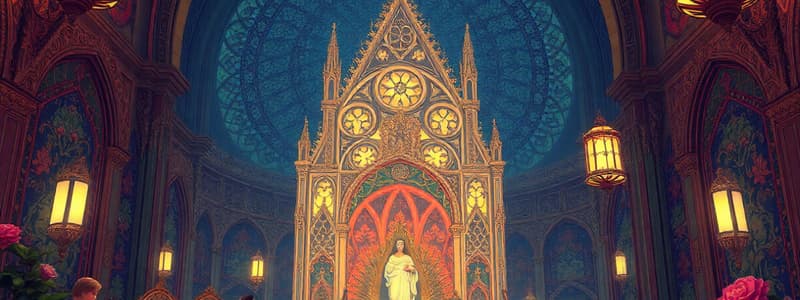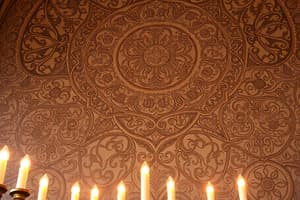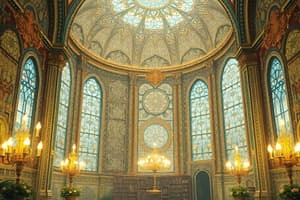Podcast
Questions and Answers
What is the definition of a sect?
What is the definition of a sect?
A religious group that separates from the larger religious denomination.
What is the definition of a denomination?
What is the definition of a denomination?
A religious organization that has slightly different beliefs from other groups that share the same religion.
What is the definition of doctrines?
What is the definition of doctrines?
Principles, beliefs, and teachings of a religion.
What is the definition of blasphemy?
What is the definition of blasphemy?
What is the definition of the Apostles?
What is the definition of the Apostles?
What is the definition of a council?
What is the definition of a council?
What is the definition of patriarchs?
What is the definition of patriarchs?
What is the definition of crusades?
What is the definition of crusades?
What is the definition of transubstantiation?
What is the definition of transubstantiation?
What is the definition of apocalyptic?
What is the definition of apocalyptic?
What is the definition of incarnation?
What is the definition of incarnation?
What is the definition of original sin?
What is the definition of original sin?
What is the definition of icons?
What is the definition of icons?
What were some early issues for Christians?
What were some early issues for Christians?
What were the first three councils Christians formed? (Select all that apply)
What were the first three councils Christians formed? (Select all that apply)
What did Constantine do in A.D. 330 that was very controversial?
What did Constantine do in A.D. 330 that was very controversial?
When does the Roman Empire collapse? Why?
When does the Roman Empire collapse? Why?
What occurs in the 7th and 8th centuries? How does this affect Christianity?
What occurs in the 7th and 8th centuries? How does this affect Christianity?
In 1054, the Great Schism occurred. How did this happen?
In 1054, the Great Schism occurred. How did this happen?
What were the Crusades fought over? About how long did they last? Were they successful?
What were the Crusades fought over? About how long did they last? Were they successful?
Describe St. Francis of Assisi.
Describe St. Francis of Assisi.
Explain Martin Luther and the Protestant Reformation.
Explain Martin Luther and the Protestant Reformation.
Who were the Anabaptist and Mennonites?
Who were the Anabaptist and Mennonites?
What do we know about King Henry VIII?
What do we know about King Henry VIII?
What occurred at the Council of Trent?
What occurred at the Council of Trent?
What are rationalists and imperialists?
What are rationalists and imperialists?
Explain the World Council in Geneva and the Second Vatican Council.
Explain the World Council in Geneva and the Second Vatican Council.
What is fundamentalism?
What is fundamentalism?
What is evangelicalism?
What is evangelicalism?
What is Pentecostalism?
What is Pentecostalism?
Explain the differences in scripture beliefs between Catholics and Protestants.
Explain the differences in scripture beliefs between Catholics and Protestants.
What do we know about scripture and how books were chosen for the New Testament early in history?
What do we know about scripture and how books were chosen for the New Testament early in history?
What are apologetics vs. apologists?
What are apologetics vs. apologists?
Who was Justin Martyr?
Who was Justin Martyr?
What is the Apostle's Creed?
What is the Apostle's Creed?
Explain the covenant between God/Jews/Christians.
Explain the covenant between God/Jews/Christians.
What is the Christmas cycle?
What is the Christmas cycle?
What is the Easter cycle?
What is the Easter cycle?
What are the sacraments?
What are the sacraments?
What are the key locations in the Holy Land?
What are the key locations in the Holy Land?
What are some of the key events that take place on mountains in the Bible?
What are some of the key events that take place on mountains in the Bible?
Explain the many uses of the tabernacle.
Explain the many uses of the tabernacle.
Who or what is the Messiah?
Who or what is the Messiah?
What are the first five books of the Bible?
What are the first five books of the Bible?
What two names do we use to encompass the first five books of the Bible?
What two names do we use to encompass the first five books of the Bible?
Name the objects used at Mass.
Name the objects used at Mass.
What is the "Tree of Reformation"?
What is the "Tree of Reformation"?
What seven books do Catholics recognize but not Protestants?
What seven books do Catholics recognize but not Protestants?
What happened in March, 5 BC?
What happened in March, 5 BC?
Who were the Roman soldiers sent by to hunt Baby Jesus?
Who were the Roman soldiers sent by to hunt Baby Jesus?
What did King Herod order while looking for Baby Jesus?
What did King Herod order while looking for Baby Jesus?
Who were the first to inform Herod about Jesus' birth?
Who were the first to inform Herod about Jesus' birth?
What was Herod diagnosed with?
What was Herod diagnosed with?
During the time of Jesus' birth, where did Herod rule, and for how long?
During the time of Jesus' birth, where did Herod rule, and for how long?
What would have happened to the soldiers if they said no to the killing of the infants?
What would have happened to the soldiers if they said no to the killing of the infants?
Who did Herod order the death of because he felt that they were plotting against him?
Who did Herod order the death of because he felt that they were plotting against him?
What did Herod change when he refurbished the Temple in Jerusalem?
What did Herod change when he refurbished the Temple in Jerusalem?
What did Herod self-proclaim himself?
What did Herod self-proclaim himself?
What are the five keys according to scripture of confirming the Messiah's birth?
What are the five keys according to scripture of confirming the Messiah's birth?
Why were the people of Jerusalem considered outliers in the Roman Empire?
Why were the people of Jerusalem considered outliers in the Roman Empire?
Why did the location of Bethlehem matter in relation to where Herod's palace was and how he rules?
Why did the location of Bethlehem matter in relation to where Herod's palace was and how he rules?
When is Caesar's finest moment and what does he do?
When is Caesar's finest moment and what does he do?
Who is Caesar's greatest rival?
Who is Caesar's greatest rival?
Who does Caesar have an affair with?
Who does Caesar have an affair with?
What is the date and time that Caesar has one hour to live?
What is the date and time that Caesar has one hour to live?
Who led the attack on Caesar on March 15th?
Who led the attack on Caesar on March 15th?
What marks the death of Caesar? (the name of the day)
What marks the death of Caesar? (the name of the day)
What battle took place two years after Caesar's death? (date and name)
What battle took place two years after Caesar's death? (date and name)
Who is the nephew of Caesar, and who is he getting ready to fight?
Who is the nephew of Caesar, and who is he getting ready to fight?
Who is trying to keep her control of Egypt during this time, and who does she kill?
Who is trying to keep her control of Egypt during this time, and who does she kill?
Who is the son of Octavian, and how does he learn to lead?
Who is the son of Octavian, and how does he learn to lead?
Who does Octavian fight in a battle, and when does this battle begin?
Who does Octavian fight in a battle, and when does this battle begin?
What happens just before the battle between Octavian and Marc Antony?
What happens just before the battle between Octavian and Marc Antony?
What two people are believed to have died by poison shortly after Marc Antony loses the battle to Octavian?
What two people are believed to have died by poison shortly after Marc Antony loses the battle to Octavian?
What was Octavian's first order of business after taking complete control of Rome?
What was Octavian's first order of business after taking complete control of Rome?
What does Octavian change his name to?
What does Octavian change his name to?
On March 22nd, 7 AD, what does Jesus refer to himself as for the first time?
On March 22nd, 7 AD, what does Jesus refer to himself as for the first time?
Explain the story of Jesus in the temple when he was 12 years old.
Explain the story of Jesus in the temple when he was 12 years old.
Where did Jesus grow up, and how far away is this place from the Mediterranean Sea?
Where did Jesus grow up, and how far away is this place from the Mediterranean Sea?
In 26 AD, where is John the Baptist baptizing people?
In 26 AD, where is John the Baptist baptizing people?
John the Baptist is beloved by everyone except who?
John the Baptist is beloved by everyone except who?
Why does John the Baptist go to prison? How many years is he there, and how does he die?
Why does John the Baptist go to prison? How many years is he there, and how does he die?
Flashcards
sect
sect
a religious group that separates from the larger religious denomination
denomination
denomination
a religious organization that has slightly different beliefs from other groups that share the same religion
doctrines
doctrines
principle, beliefs, and teachings of a religon
blasphemy
blasphemy
Signup and view all the flashcards
apostles
apostles
Signup and view all the flashcards
gentile
gentile
Signup and view all the flashcards
council
council
Signup and view all the flashcards
martyr
martyr
Signup and view all the flashcards
patriarchs
patriarchs
Signup and view all the flashcards
pope
pope
Signup and view all the flashcards
crusades
crusades
Signup and view all the flashcards
transubstantiation
transubstantiation
Signup and view all the flashcards
apocalyptic
apocalyptic
Signup and view all the flashcards
cannon
cannon
Signup and view all the flashcards
heresy
heresy
Signup and view all the flashcards
incarnation
incarnation
Signup and view all the flashcards
original sin
original sin
Signup and view all the flashcards
icons
icons
Signup and view all the flashcards
what were some early issues for Christians?
what were some early issues for Christians?
Signup and view all the flashcards
what were the first 3 councils Christians formed? what were the dates? what was discussed at each council?
what were the first 3 councils Christians formed? what were the dates? what was discussed at each council?
Signup and view all the flashcards
what did Constantine do in A.D. 330 that was very controversial?
what did Constantine do in A.D. 330 that was very controversial?
Signup and view all the flashcards
when does the Roman Empire collapse? why?
when does the Roman Empire collapse? why?
Signup and view all the flashcards
what occurs in the 7th and 8th centuries? how does this affect Christianity?
what occurs in the 7th and 8th centuries? how does this affect Christianity?
Signup and view all the flashcards
in 1054 we have the mutual excommunication between Rome and Constantinople. how did this occur?
in 1054 we have the mutual excommunication between Rome and Constantinople. how did this occur?
Signup and view all the flashcards
what were the Crusades fought over? about how long did they last? were they successful?
what were the Crusades fought over? about how long did they last? were they successful?
Signup and view all the flashcards
describe St. Francis of Assisi
describe St. Francis of Assisi
Signup and view all the flashcards
explain Martin Luther and the Protestant Reformation
explain Martin Luther and the Protestant Reformation
Signup and view all the flashcards
who were the Annabaptist and Mennonites?
who were the Annabaptist and Mennonites?
Signup and view all the flashcards
what do we know about King Henry VIII?
what do we know about King Henry VIII?
Signup and view all the flashcards
what occurred at the Council of Trent?
what occurred at the Council of Trent?
Signup and view all the flashcards
Study Notes
Catholicism Flashcards - Study Notes
-
Sect: A religious group that separates from a larger denomination.
-
Denomination: A religious organization with slightly different beliefs from other groups sharing the same religion.
-
Doctrines: Principles, beliefs, and teachings of a religion.
-
Blasphemy: Defaming anything considered sacred; in Christianity, hateful thoughts, words, or acts against God, Christ, the Church, saints, or holy things.
-
Apostles: Originally the Twelve chosen by Jesus to assist him. The successors are the Catholic Church's bishops.
-
Gentile: A person not of Jewish origin.
-
Council: A gathering of all bishops globally, called by the pope, exercising authority over the universal Church.
-
Martyr: A witness to faith enduring death for their beliefs.
-
Patriarchs: Bishops in ancient Eastern Orthodox or Western Churches with authority over other bishops.
-
Pope: Bishop of Rome, having primacy over other bishops in the Catholic Church.
-
Crusades: Military expeditions (11th-13th centuries) by Western Christians to regain the Holy Land.
-
Transubstantiation: The change of bread and wine's substance into Jesus' body and blood in the Eucharist.
-
Apocalyptic: Prophetic or symbolic revelations about the end of the world.
-
Canon: The 27 New Testament books and 46 Old Testament books accepted as inspired by the Catholic Church.
-
Heresy: Obstinate denial or doubt of a divinely and Catholically believed truth after baptism.
-
Incarnation: God's Son taking human form.
-
Original Sin: The condition of sinfulness all humans share due to Adam and Eve's disobedience.
-
Icons: Religious images or paintings traditional in Eastern Christianity.
-
Early Christian Issues: Persecution and lack of acceptance.
-
First Three Church Councils:
-
Council of Nicea (325): Nicene Creed composed.
-
Council of Constantinople (381): Nicene Creed further developed; Trinity doctrines emphasized.
-
Council of Chalcedon (451): Defined Jesus' full humanity and divinity; established 5 patriarchs.
-
Constantine's Controversial Move (AD 330): Moving the Roman Empire capital to Byzantium (Constantinople), contributing to the later split of the Church into Roman and Eastern branches.
-
Roman Empire's Collapse (5th Century): Invasion by Germanic tribes. The split into 5 patriarchs decreased power and unity.
-
7th/8th Centuries: Muslim conquests affecting Christian freedom in parts of the Byzantine Empire.
-
Great Schism (1054): Mutual excommunication between Rome and Constantinople over the addition of "and the Son" to the Nicene Creed.
-
Crusades (Duration/Success): Approximately 200 years; unsuccessful in reclaiming Jerusalem.
-
St. Francis of Assisi: 1182-1226; humble man advocating for poverty (mendicants).
-
Martin Luther & Protestant Reformation: Criticized Church practices, initiated the 95 Theses, leading to new denominations.
-
Anabaptists/Mennonites: Protestant groups rejecting infant baptism and advocating simpler worship forms.
-
King Henry VIII: Declared himself head of the Church of England due to religious disputes, had six wives, and fathered three heirs.
-
Council of Trent (1545-1563): Reaffirmed papal supremacy and transubstantiation; articulated mass as a sacrifice and salvation.
-
Rationalism/Imperialism: Rationalism emphasizing human reason for knowledge; Imperialism believing human experience is primary for knowledge.
-
World Council/Second Vatican Council: World Council (1948) promoted Christian unity; Second Vatican Council (1962-1965) furthered religious understanding and altered church practices.
-
Fundamentalism/Evangelicalism/Pentecostalism: Diverse expressions of Christian faith emphasizing different emphases.
-
Catholic/Protestant Scripture Beliefs: Catholics recognize 46 Old Testament books; Protestants recognize 39. Catholics have the pope as head of the church, protestants do not.
-
New Testament Canon Selection: Criteria for selecting New Testament books: apostolic connection; ancient origins; widespread knowledge; divine revelation.
-
Apologetics/Apologists: Apologists write defenses of their faith; apologetics are their writings.
-
Justin Martyr: Prominent 2nd-century apologist, martyred around AD 165.
-
Apostle's Creed (AD 150): Based on apostolic teachings; emphasized the Trinity and Jesus' sinless humanity.
-
God/Jews/Christians Covenant: Jewish covenant with God established by Moses, with a promise of a Messiah fulfilled in Jesus for Christians.
-
Christmas Cycle: Begins with Advent, 4 Sundays before Christmas; Orthodox Christmas celebrated on January 7th.
-
Easter Cycle: Greatest feast; 40 days of Lent precede it, linked to Passover (lunar calendar).
-
Sacraments (7): Baptism, Eucharist, Reconciliation, Matrimony, Holy Orders, Anointing of the Sick, First Communion; Catholic understanding.
-
Holy Land: Locations of Jesus' birth, upbringing, ministry, death, and resurrection: Bethlehem, Nazareth, Galilee, Jerusalem.
-
Mount Events: Moses receiving the 10 commandments; Sermon on the Mount; Jesus' transfiguration; Holy Week prayers.
-
Tabernacle: Holds and stores the Eucharist.
-
Messiah: Hebrew for "anointed one"; predicted in the covenant; Jesus is the Messiah for Christians.
-
First Five Books of the Bible: Genesis, Exodus, Leviticus, Numbers, Deuteronomy (Pentateuch/Torah).
-
Mass Objects: Various liturgical items (alb, altar, chalice, etc.).
-
Tree of Reformation: Diagram of Protestant denominations that emerged from the Reformation.
-
Seven Books Recognized by Catholics but Not Protestants:
-
1 & 2 Maccabees
-
Tobit
-
Judith
-
Sirach
-
Wisdom
-
Baruch
-
5 BC Events: Roman soldiers searching for baby Jesus.
-
Herod's Orders: Killing all male children under 2 years old.
-
Herod's Advisers: Magi.
-
Herod's Health: Various ailments.
-
Herod's Rule (Time/Location): Ruled over Jerusalem for 30 years.
-
Soldiers' Fate: Refusal to obey Herod's order resulted in death.
-
Herod's Victims: Wife, sons, and mother-in-law.
-
Temple Refurbishments: Herod's alterations honoring himself, not God.
-
Herod's Self-Proclamation: King of the Jews; not welcomed in Jewish temples.
-
Messiah's Birth—Scripture Keys:
-
Star in the East.
-
Birth in Bethlehem.
-
Davidic lineage.
-
Visits from wise men.
-
Virgin birth.
-
Jewish Outlier Status: Uniquely monotheistic.
-
Bethlehem & Herod's Palace: Bethlehem's proximity to Jerusalem meant Herod did not have to monitor the killing.
-
Caesar's Finest Moment: (49 BC) Defeated Germanic tribes
-
Caesar's Rival: Pompey
-
Caesar's Affair: With Cleopatra of Egypt
-
Caesar's Death: March 15, 44 BC, 11 am
-
Caesar's Assassins: Brutus, Lucious and Publius
-
Ides of March: Marking Caesar's death
-
Battle of Philippi: (42 BC) Octavian vs. Brutus (and Cassius)
-
Octavian's Kinship: Nephew of Caesar.
-
Cleopatra's Action: Killed her brother, Ptolemy, to maintain power.
-
Tiberius' Leadership: Ruthless and cruel.
-
Archelaus' Removal: Sent men to trample people (over 300).
-
Great Sanhedrin (Composition/Authority): 71 judges—absolute authority with limitations on death penalties.
-
Jesus' Temple Ministry (27 AD): Driving merchants out of the Temple.
-
Capernaum (27 AD): Jesus seeking Simon (Peter).
-
Jesus' Disciples: Originally chosen 12 disciples (4 fishermen: Simon, Andrew, James, John).
-
Fishermen's Value: Multilingual skills.
-
Sermon on the Mount Outcomes: Beatitudes and Our Father prayer.
-
Disciple/Apostle Distinction: Disciple listens; Apostle acts.
-
Jesus' Belief (29 AD): King of the Jews
-
Roman Emperor (29 AD): Pontius Pilate
-
Jesus' Final Days: April 2nd, 30 AD (6 days to live).
-
Peter's Action: Purchased a sword.
-
Jesus' Final Stop Lazarus' house
-
Additional Reading: John Calvin and Martin Luther information needed.
Studying That Suits You
Use AI to generate personalized quizzes and flashcards to suit your learning preferences.




